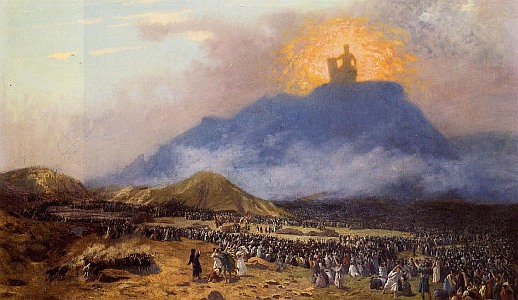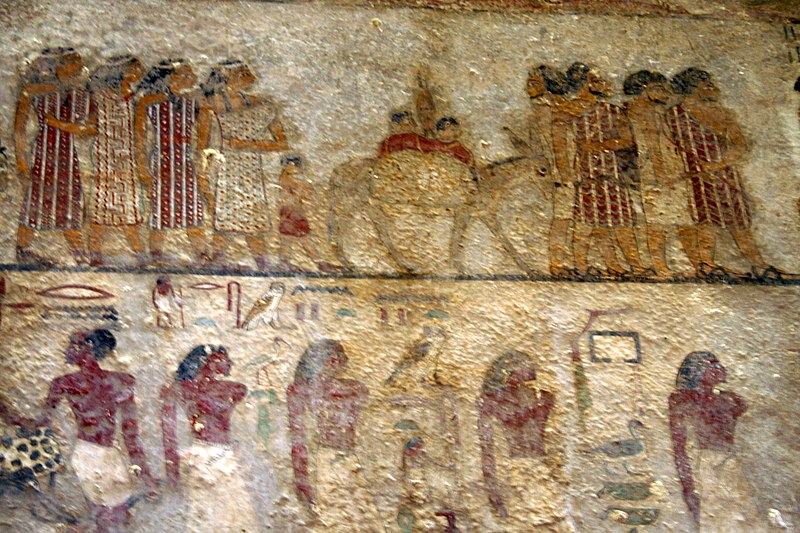
1.) OLD ROMAN LECTIONARY
Introit
(Wisdom 11:24, 25, 27; Psalm 56:2 [57:1])
You have mercy upon all, O Lord, and loathe nothing that you have made, overlooking the sins of men for the sake of repentance and sparing them, for you are the Lord our God.Epistle
Have mercy on me, O God; have mercy on me! for my soul trusts in you.
V: Glory be to the Father...
You have mercy upon all, O Lord...
(Joel 2:12-19)
Thus says the LORD:Gradual
Turn to me with all your heart - with fasting, weeping, and mourning; and rend your hearts and not your clothing.
Return to the LORD, your God, for He is gracious and merciful, slow to anger, and great in loyal love, and He relents from calamity.
Who knows if He will return and relent, and leave a blessing behind Him, a grain offering and a drink offering for the LORD, your God?
Blow the trumpet in Zion, consecrate a fast, call a solemn assembly!
Gather the people, sanctify the congregation!
Assemble the elders, gather the children and those who suck the breasts;
Let the bridegroom go out from his room, and the bride from her chamber.
Let the priests, who minister to the LORD, weep between the vestibule and the altar.
Let them say, 'Spare your people, O LORD, and do not give your heritage to reproach, that the nations should rule over them. Why should they say among the peoples, "Where is their God?"'
The LORD has been zealous for His land, and had pity on His people.
The LORD answered and said to His people, "Behold! I am sending grain to you and new wine and oil, and you will be fully satisfied; and I will no longer make you a reproach among the nations," says the LORD almighty.
(Psalm 56:2, 4 [57:1, 3])
Have mercy on me, O God; have mercy on me! For my soul trusts in You.Tract
V: He sends from heaven and delivers me, He has put to shame those who trample on me.
(Psalm 102 [103]:10; Psalm 78 [79]:8, 9)
LORD, do not deal with us according to our sins, nor repay us according to our iniquities.Gospel
V: LORD, remember not our former iniquities; let your mercies quickly confront us, for we have become very poor.
(Here kneel)
V: Help us, O God, our Savior; and for the glory of your Name, O LORD, deliver us; and forgive us our sins for your Name's sake.
(Matthew 6:16-21)
At that time, Jesus said to His disciples, "When you fast, do not be like the hypocrites who put on gloomy faces, for they disfigure their faces so as to show others that they are fasting. Amen I tell you, they have their reward. But when you fast, anoint your head and wash your face, so that you do not appear to men to be fasting, but by your Father who is in secret. And your Father, who sees in secret, will repay you.Offertory
"Do not lay up for yourselves treasures on the earth, where moth and rust consume and where thieves break in and steal; but lay up for yourselves treasures in heaven, where moth and rust do not consume and where thieves do not break in and steal. For where your treasure is, there your heart will also be."
(Psalm 29:2-3 [30:1-2])
I will extol You, O LORD, for you lifted me up, and did not let my enemies rejoice over me;Communion
O LORD, my God, I cried out to you, and you healed me.
(Psalm 1:2, 3)
He who meditates on the Law of the LORD day and night, shall bring forth his fruit in due season.2.) NEW ROMAN LECTIONARY
First Reading
(Joel 2:12-18)
Psalm
(Psalm 51 [50]:3-4, 5-6ab, 12-13, 14 and 17 [1-2, 3-4a, 10-11, 12 and 15])
R. Be merciful, O Lord, for we have sinned.Second Reading
Have mercy upon me, O God, according to your steadfast love;
According to your abundant mercy blot out my transgressions.
Thoroughly wash me from my iniquity, and cleanse me from my sin.
R. Be merciful, O Lord, for we have sinned.
For I know my transgressions, and my sin is ever in front of me.
Against you – only you – have I sinned, and done what is evil in your sight.
R. Be merciful, O Lord, for we have sinned.
Create in me a clean heart, O God, and renew a steadfast spirit within me.
Cast me not away from your Presence, and take not your holy Spirit from me.
R. Be merciful, O Lord, for we have sinned.
Restore to me the joy of your salvation, and a willing spirit sustain in me.
O LORD, open my lips, and my mouth will proclaim your praise.
R. Be merciful, O Lord, for we have sinned.
(2 Corinthians 5:20 - 6:2)
Brothers and sisters:Gospel
We are ambassadors for Christ, as though God were pleading through us. We plead with you on behalf of Christ: Be reconciled to God. For He made Him who did not know sin to be sin for us, so that we would become the righteousness of God in Him. Working together, then, we also urge you not to receive the grace of God in vain. For He says, "In an acceptable time I have heard you, and in the day of salvation I have helped you." Behold, now is the 'acceptable time'; behold, now is 'the day of salvation'!
(Matthew 6:1-6, 16-18)
Jesus said to His disciples, "Be careful not to display your righteousness before men, to be seen by them. Otherwise you have no reward from your Father in heaven.3.) MOZARABIC LECTIONARY
"Thus, whenever you give alms, do not blow a trumpet before you, as the hypocrites do in synagogues and in the streets, that they may have glory from men. Amen I tell you, they have their reward. But when you give alms, do not let your left hand know what your right hand is doing so that your alms may be in secret. And your Father, who sees in secret, will reward you.
"And when you pray, do not be like the hypocrites, because they love to pray standing in the synagogues and on the corners of the streets, that they may be seen by men. Amen, I say to you, they have their reward. But you, when you pray, go into your room, and when you have shut your door, pray to your Father in secret. And your Father, who sees in secret, will reward you.
"And when you fast, do not be like the hypocrites who put on gloomy faces, for they disfigure their faces so as to show others that they are fasting. Amen I tell you, they have their reward. But when you fast, anoint your head and wash your face, so that you do not appear to men to be fasting, but by your Father who is in secret. And your Father, who sees in secret, will repay you."
(Feria Quarta in Capite Jejunii)
Prophecy
(Proverbs 1:23-32)
Son:Psallendo
Give heed to my reproof; I will pour out my spirit to you; I will make my words known.
Because I have called and you refused; I have stretched out my hand and no one heeded.
You disdained all my counsel, and neglected my reproof.
I will laugh at your disaster; I will mock when your dread comes;
When your dread comes like a whirlwind, and your disaster comes like a storm; when distress and trouble come upon you;
Then they will call on me, but I will not answer; they will rise in the morning, but they will not find me.
Because they have hated instruction, and did not choose the fear of the LORD, nor consented to my counsel, but despised all my reproof.
Therefore they shall eat the fruit of their own way, and be filled with their own fancies.
The turning away of the simple will slay them, and the complacemency of fools will destroy them.
(cf. Isaiah 1:17a)
Behold, the day of the Lord shall come, with great alms and fasting: be prepared to do good to the oppressed, the widows and the orphans.Epistle
P: That you may receive a reward in the last days, says the Lord.
V: Learn to do well, seek judgment, relieve the oppressed.
P: That you may receive a reward...
(James 1:13-21)
Beloved:Gospel
Let no one say when he is tempted, "I am tempted by God", for God cannot be tempted by evil, nor does He Himself tempt anyone. But each one is tempted when he is lured and enticed by his own desires. Then when desire has conceived, it gives birth to sin, and sin, when it is full grown, gives birth to death. Do not be deceived, my beloved brethren.
Every good gift and every perfect gift is from above, coming down from the Father of lights, with whom there is no variation or shadow of turning. Having willed, He brought us forth by the word of truth, that we might be a kind of firstfruits of His creatures.
Understand this, my dear brethren! Let every man be swift to listen, slow to speak, slow to anger, for the wrath of man does not produce the righteousness of God.
Therefore lay aside all filthiness and overflow of wickedness, and receive with meekness the implanted word, which is able to save your souls.
(Matthew 4:1-11)
At that time, our Lord Jesus Christ was led by the Spirit into the wilderness to be tempted by the devil. And having fasted forty days and forty nights, afterward He was hungry. And the tempter came and said to Him, "If you are the Son of God, command these stones to become bread." But He answered and said, "It is written: 'Man shall not live by bread alone, but by every word that comes from the mouth of God.'"Lauda
Then the devil took him to the holy city, and he stood Him on the highest point of the temple and said to Him, "If you are the Son of God, throw yourself down. For it is written, 'He will command His angels concerning you,' and, 'On their hands they will bear you up, so that you will not dash your foot against a stone.'" Jesus said to him, "It is written again, 'You shall not put the LORD your God to the test.'"
Again, the devil took Him up on a very high mountain, and showed Him all the kingdoms of the world and their glory.
And he said to Him, "All these things I will give you if, falling down, you will worship me." Then Jesus said to him, "Away with you, Satan! For it is written, 'You shall worship the LORD your God, and serve only Him'."
Then the devil left Him, and behold, angels came and ministered to Him.
(Psalm 105 [106]:4)
Alleluia.Sacrificium
V: Remember us, O LORD, in the favor of your people: visit us, o our God, with your salvation.
P: Alleluia.
This day, prayer shall make you holy; and shall humble your souls; direct your burnt offering to the Lord your God.Ad accedentes
(Psalm 33:9, 2, 23 [34:8, 1, 22])
Taste and see that the LORD is good; Alleluia, Alleluia, Alleluia.
V: I will bless the LORD at all times; continually will His praise be in my mouth.
P: Alleluia, Alleluia, Alleluia.
V: The LORD redeems the soul of His servants, and none of those who trust in Him shall be condemned.
P: Alleluia, Alleluia, Alleluia.
V: Glory and honor to the Father, and to the Son, and to the Holy Spirit, forever and ever. Amen.
P: Alleluia, Alleluia, Alleluia.











